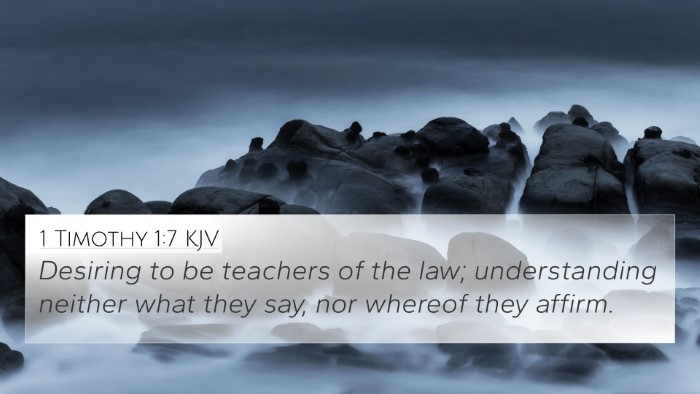Old Testament
Genesis Exodus Leviticus Numbers Deuteronomy Joshua Judges Ruth 1 Samuel 2 Samuel 1 Kings 2 Kings 1 Chronicles 2 Chronicles Ezra Nehemiah Esther Job Psalms Proverbs Ecclesiastes Song of Solomon Isaiah Jeremiah Lamentations Ezekiel Daniel Hosea Joel Amos Obadiah Jonah Micah Nahum Habakkuk Zephaniah Haggai Zechariah MalachiJob 32:12 Similar Verses
Job 32:12 Cross References
Yea, I attended unto you, and, behold, there was none of you that convinced Job, or that answered his words:
Uncover the Rich Themes and Topics of This Bible Verse
Listed below are the Bible themes associated with Job 32:12. We invite you to explore each theme to gain deeper insights into the Scriptures.
Job 32:12 Cross Reference Verses
This section features a detailed cross-reference designed to enrich your understanding of the Scriptures. Below, you will find carefully selected verses that echo the themes and teachings related to Job 32:12 KJV. Click on any image to explore detailed analyses of related Bible verses and uncover deeper theological insights.

Job 32:3 (KJV) »
Also against his three friends was his wrath kindled, because they had found no answer, and yet had condemned Job.

1 Timothy 1:7 (KJV) »
Desiring to be teachers of the law; understanding neither what they say, nor whereof they affirm.
Job 32:12 Verse Analysis and Similar Verses
Understanding Job 32:12
Job 32:12 states: "But I found no one who would answer, nor one who would reply to his words." This verse comes at a critical juncture in the book of Job, highlighting the themes of silence, wisdom, and the search for truth amidst suffering. Below is a combined summary of insights from public domain commentaries by Matthew Henry, Albert Barnes, and Adam Clarke, aimed at providing a clear interpretation and deeper understanding of this scripture.
Contextual Background
Prior to this verse, Job has been engaged in a deep dialogue with his friends about his immense suffering and the reasons behind it. Elihu, who speaks in this verse, emerges as a new voice in the narrative. It is important to note the significance of listeners in the process of wise discourse.
Key Insights from Commentaries
- Matthew Henry: Henry emphasizes the silence of Job's friends and how it signifies a lack of wisdom. He points out that while they have been vocal, their words have not brought any real understanding or comfort to Job's plight. Elihu's assertion highlights a search for someone who could speak with authority and insight, echoing the ultimate quest for divine wisdom.
- Albert Barnes: Barnes interprets this as a commentary on the human condition and the nature of conversations related to suffering. He notes that Job's friends were unable to provide what Job truly needed—a genuine and understanding reply. This silence reflects a deeper truth about the limits of human understanding in the face of divine mysteries.
- Adam Clarke: Clarke adds to this by suggesting that Elihu’s declaration serves to position him as a mouthpiece for divine truths. He notes that silence in the face of profound truths can be more telling than words. Elihu's role becomes crucial as he represents a new perspective in the discussion, one that acknowledges the limitations of Job's friends.
Key Themes
- Search for Truth: The verse showcases the search for wisdom and the often quiet frustration in finding someone who can adequately address and respond to the complexities of life and suffering.
- Silence and Wisdom: It reflects on the theme of silence, suggesting that sometimes, the absence of words can speak volumes about the quest for understanding.
- Role of the Speaker: Elihu’s introduction as a new voice in the dialogue implies the importance of fresh perspectives in discussions about faith, suffering, and divine justice.
Bible Cross References
Job 32:12 connects to various other Scriptures that reinforce its themes:
- Job 16:21 - “O that a man might plead with God, as a man pleadeth for his neighbor!”
- Job 13:23-24 - “How many are mine iniquities and sins? Make me to know my transgression and my sin. Why hidest thou thy face, and holdest me for thine enemy?”
- Proverbs 18:13 - “He that answereth a matter before he heareth it, it is folly and shame unto him.”
- Ecclesiastes 3:7 - “A time to rend, and a time to sew; a time to keep silence, and a time to speak.”
- Isaiah 41:1 - “Keep silence before me, O islands; and let the people renew their strength: let them come near; then let them speak: let us come near together to judgment.”
- James 1:19 - “Wherefore, my beloved brethren, let every man be swift to hear, slow to speak, slow to wrath.”
- 1 Peter 3:15 - “But sanctify the Lord God in your hearts: and be ready always to give an answer to every man that asketh you a reason of the hope that is in you with meekness and fear.”
Thematic Bible Verse Connections
The connection within the Bible regarding silence and listening is recurrent:
- Psalm 46:10 - “Be still, and know that I am God.”
- Proverbs 1:5 - “A wise man will hear, and will increase learning; and a man of understanding shall attain unto wise counsels.”
Conclusion
Job 32:12 offers a poignant reflection on the dynamics of conversation about suffering and wisdom. It highlights the necessity of both speaking and listening in the pursuit of understanding. This verse, enriched by meanings drawn from public domain commentaries, stands as a reminder of the depth of biblical discourse surrounding the nature of human experience in relation to divine truth.
Exploring Cross-Reference Tools
To delve deeper into the connections in scripture, utilizing tools for Bible cross-referencing, such as a Bible concordance or a cross-reference Bible study guide, can significantly enhance understanding. By actively seeking cross-referencing biblical texts, readers can uncover rich thematic Bible verse connections that illuminate profound truths across the scripture.
In closing, embracing the art of cross-referencing Bible study methods allows the discovery of Bible verses that relate to each other, ultimately leading to a deeper faith and comprehension of God's Word.


